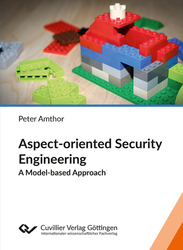| Fachbereiche | |
|---|---|
| Buchreihen (97) |
1381
|
| Nachhaltigkeit |
3
|
| Gesundheitswesen |
1
|
| Geisteswissenschaften |
2370
|
| Naturwissenschaften |
5407
|
| Mathematik | 228 |
| Informatik | 319 |
| Physik | 980 |
| Chemie | 1364 |
| Geowissenschaften | 131 |
| Humanmedizin | 243 |
| Zahn-, Mund- und Kieferheilkunde | 10 |
| Veterinärmedizin | 108 |
| Pharmazie | 147 |
| Biologie | 835 |
| Biochemie, Molekularbiologie, Gentechnologie | 121 |
| Biophysik | 25 |
| Ernährungs- und Haushaltswissenschaften | 45 |
| Land- und Agrarwissenschaften | 1005 |
| Forstwissenschaften | 201 |
| Gartenbauwissenschaft | 20 |
| Umweltforschung, Ökologie und Landespflege | 148 |
| Ingenieurwissenschaften |
1798
|
| Allgemein |
98
|
|
Leitlinien Unfallchirurgie
5. Auflage bestellen |
|
Erweiterte Suche
Aspect-oriented Security Engineering
A Model-based Approach
Peter Amthor (Autor)Vorschau
Leseprobe, PDF (600 KB)
Inhaltsverzeichnis, PDF (540 KB)
Engineering secure systems is an error-prone process, where any decision margin potentially favors critical implementation faults. To this end, formal security models serve as an abstract basis for verifying security properties. Unfortunately, the potential for human error in engineering and analyzing such models is still considerable.
This work seeks to mitigate this problem. We identified semantic gaps between security requirements, informal security policies, and security models as a major source of error. Our goal is then based on this observation: to support error-minimizing design decisions by bridging such gaps. Due to the broad range of security-critical application domains, no single modeling framework may achieve this. We therefore adopt the idea of aspect-oriented software development to tailor the formal part of a security engineering process towards security requirements of the system.
Our method, termed aspect-oriented security engineering, is based on the idea of keeping each step in this process well-defined, small, and monotonic in terms of the degree of formalism. Our practical results focus on two use cases: first, model engineering for operating systems and middleware security policies; second, model analysis of runtime properties related to potential privilege escalation. We eventually combine both use cases to present a model-based reengineering approach for the access control system of Security-Enhanced Linux (SELinux).
| ISBN-13 (Printausgabe) | 9783736999800 |
| ISBN-13 (E-Book) | 9783736989801 |
| Buchendformat | A5 |
| Sprache | Englisch |
| Seitenanzahl | 260 |
| Umschlagkaschierung | matt |
| Auflage | 1. |
| Erscheinungsort | Göttingen |
| Promotionsort | Ilmenau |
| Erscheinungsdatum | 05.03.2019 |
| Allgemeine Einordnung | Dissertation |
| Fachbereiche |
Informatik
|
| Schlagwörter | Information Security, Computer Security, System Security, System Design, Software Engineering, Security Engineering, Security Policy, Security Model, Security Property, Security Analysis, Access Control, Role-based Access Control, RBAC, Attribute-based Access Control, ABAC, Aspect-oriented Engineering, Non-functional Property, Formal Methods, Entity Labeling, Model-based Design, Model Engineering, Model Analysis, Model Core, Dynamic Property, Safety, Heuristic Analysis, Operating System, Middleware, Linux, SELinux |
| URL zu externer Homepage | https://www.tu-ilmenau.de/vsbs/ |








